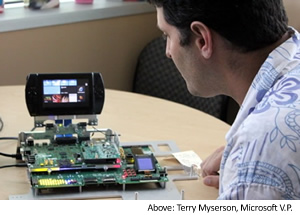On Monday, Steve Ballmer issued a memo informing Microsoft employees that leadership of the Windows Phone 7 team would be handed over to vice president and lead engineer, Terry Myerson. The former division president, Andy Lees, will be working on a special project that aims to yield the "maximum impact" of Windows Phone 7 and Windows 8 in 2012. Lees had been the president of the WP7 team for three years.
While "driving maximum impact" is not clearly defined, Microsoft may be planning some substantial tie-in between Windows Phone 7 and Windows 8. Perhaps this will translate into tight integration between the two platforms, mutual promotions, common design elements, ideas for tablet PCs or even some sort of platform unification. Regardless, the implications could be profound. We'll just have to rely on our imaginations for now.
Ballmer admitted Windows Phone 7 has not seen the kind of traction Microsoft would like, with a mere 1.5 percent market share among smart phones world-wide. Analysts have also shown that WP7 has all but stopped in growth while Android gobbles up most new smartphone owners across the globe.
Despite the company's difficulties, Microsoft's CEO points out that smart phones with WP7 continue to receive favorable reviews and people generally seem to like the platform. Early this year, we reported that 93 percent of WP7 owners were either satisfied or very satisfied with their phones and 90 percent were willing to recommend the platform to their friends.
Ballmer also suggested Microsoft's recent deal with Nokia will help forge a healthy future for Microsoft's mobile endeavor. As part of the deal, the handset maker will been manufacturing WP7 phones for global distribution. The Lumia is the only Nokia phone currently available with WP7.
As part of a holiday promotion, Microsoft is still offering their $25 prepaid app store card for the purchase of any WP7 phone until December 31.
